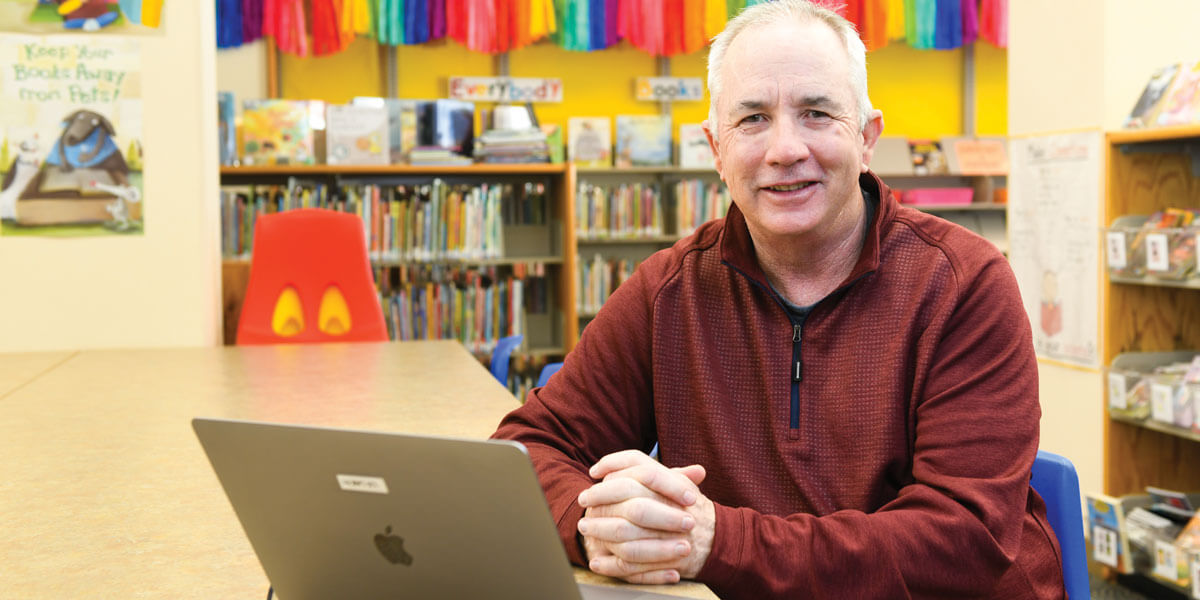Twenty years ago, Lower School Technology Coordinator Bill Witt was shocked when he applied for a position at Colorado Academy and was told he was not even going to get an interview.
After all, he was an experienced, award-winning elementary school teacher in Douglas County, midway through completing his Masters in Information and Learning Technology at the University of Colorado Denver. He had found the position for a Lower School Computer Lab Supervisor, which had been posted by CA’s then Director of Technology for Curriculum, Jan Beattie, on a list of job opportunities for CU Denver graduate students.
Undaunted by initial rejection, he contacted CA to ask why he had not moved ahead in the interview process. “They said, ‘Your credentials don’t match,’” he recalls. “I thought, ‘That’s crazy! This job is perfect for me!’”
So he wrote letters to everyone he could find at the school, including then Head of School Chris Babbs. Until a chance conversation two years ago, he never knew exactly what happened next: “I learned by accident that one day Chris Babbs walked out of his office, and he said, ‘You know, maybe we ought to interview this guy.’”
Babbs must have agreed that Witt was a “perfect” match for the job, because he hired him, starting with the 2002-2003 school year.
“He was ‘perfect for the job,’” says Beattie. “He adapted to new tech and methods, always updating his curriculum to meet the changing needs of his students, and always keeping his students engaged, learning, and problem solving. He encouraged questioning, curiosity, and experimentation, yet steered the students to stay on track. When something new in educational software and hardware technology came along, he was quick to test it and adopt the best.”
Now, after 19 years at CA teaching Lower School students to love all sorts of technology—from 3D printers to coding—as well as coaching both Boys and Girls Golf, Witt is ready to retire, but he will not forget his favorite days in the classroom.
“I’m happiest when the lab is busy all day, including during lunch,” he laughs. “When I only have enough time to run to the Campus Center, grab a sandwich, and bring it back, because the lab is filled with kids—I love that.”
‘The vision changed’
Witt found his way to teaching through his wife, Catherine. When they met, she was a teacher, and he was ready for a career change.
“The culture of faculty, schools, and families appealed to me,” he recalls. “Catherine enjoyed what she was doing, and so I decided to follow in her footsteps.”
In 2002, Witt arrived to find a Lower School Computer Lab that was set up with rows of carrels, separated by dividers, sporting those translucent, candy-colored, but bulky early iMacs. Students were given 45 minutes a week in the lab, with a focus on learning to keyboard, the basics of editing documents, and turtle Logo programming. In characteristically low-key style, he sums up what happened next: “The vision changed over time.”
The desktops gave way to mobile laptops and iPads. Witt introduced 3D printing and robotics. The dividers between computers were eliminated, and the Lab became more open. Witt adjusted his curriculum to support the material teachers were covering in the classroom. In short, he focused more on projects than on programs.
“We don’t say, you will learn this, this, and this software program,” he says. “If a student comes in now, I say, ‘What do you and your teacher want to accomplish?’ And then we figure out what is the appropriate program—the best tool—to accomplish the goal of the project. So it’s much more individualized.”
In Witt’s view, 45 minutes a week wasn’t enough time for students to move forward quickly on big projects. He opened the lab to students whenever they had time to come, and he made himself available to help them. “I might have a class of 16 First Graders in class,” he says. “At the same time, I might have three or four Fourth Graders working on projects in the back of the room.”
Witt also organized multiple Lower School Wonder League teams, competing with Dash and Dot robots over their lunch hour, and helped young video artists develop their Claymation stop-motion skills, not to mention being the early go-to guy when Lower School teachers needed classroom help with their interactive whiteboards, projectors, laptops, and iPads.
“Students love Mr. Witt and are dazzled when they have an opportunity to learn a new app, create code with him, or design an object from their imagination on the 3D printer,” says Lower School Principal Angie Crabtree. “He does so many ‘behind the scenes’ tasks to help the Lower School operate every day, and he is always kind and gracious about offering his expertise.”
‘The evolution of teaching technology’
Witt coached Ice Hockey and also served as an assistant coach to the Girls Golf team, which won the State Championship for three straight years—2017, 2018, 2019—and the Boys Golf team, which won the State Championship during the pandemic in fall 2020.
“It’s been really rewarding to work with kids who may not be really experienced at the sport,” he says. “I enjoy watching them grow and improve.”
As for those State Championships, he’s got a simple response: “It’s been nice to win.”
There might be more time for golf in Witt’s future, and he’s also looking forward to travel that’s been postponed during the pandemic. But he will miss the “camaraderie with teachers and staff at CA” and the part of his career that makes him proudest: “I’m proud of the evolution of teaching technology—both what we taught and how students learn.”
